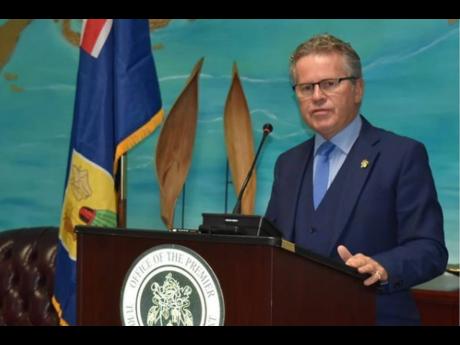Editorial | UK must call out US on guns
Beyond the embarrassment of Jamaican gangsters being accused of the responsibility for a surge of violence in the Turks and Caicos Islands, the situation again validates the need for coordinated Caribbean response to the region’s crisis of crime, including one of the major sources – the inflow of illegal guns from the United States.
Jamaica, as perhaps the problem’s worst long-term victim, should assume leadership of this effort, to which Great Britain should be co-opted and leaned on to leverage its so-called special relationship with the Americans to do more to stop their weapons being used to make killing fields of these islands.
Further, the Caribbean, as this newspaper suggested only on Saturday, should make common cause with other countries, especially those in Latin America, such as Mexico, in relentlessly confronting the Americans about their dilatory behaviour.
Jamaica’s problem of crime is well known. On average, in recent years, more than 1,400 murders are committed here, for a homicide rate that hovers at around 50 per 100,000. More than 70 per cent of these killings are gang-related. Upwards of 80 per cent are committed with guns, which are not manufactured on the island.
Indeed, while the police seize upwards of 700 illegal guns annually, multiples of that amount are believed to make their way to criminals, either directly from the United States or through third countries, especially Haiti.
In other words, Jamaica faces a transnational problem, as was indicated by Prime Minister Andrew Holness in his address at the United Nations General Assembly last month, and more bluntly asserted by Turks and Caicos Islands’ Governor, Nigel Dakin, about that territory this week.
TURF WAR
The Turks and Caicos Islands cover only 366 square miles. Its population is around 46,000. Largely, the north Caribbean islands are still considered idyllic tourism destinations. However, in recent years that image of paradise has been dented. For example, in 2020 the territory recorded 22 murders. That fell to 13 last year. But so far this year, there have been at least 16 homicides, the bulk occurring in September – the result of dramatic gang shoot-outs. Jamaican gangs, seeking to expand turf, have been involved.
According to Governor Dakin, the territory’s premier, Charles Misick, met with Jamaican officials “and we hope for support from them, as well”.
“The trans-regional criminal links to their country makes a strengthened intelligence exchange a priority. Through steady investment and planning, much of the architecture needed to take gangs apart has already been built,” he told the Islands’ House of Assembly. “This isn’t good luck, but good planning.”
This newspaper agrees. However, this cooperation requires more than an exchange of intelligence between the Jamaican and Turks and Caicos authorities, or a select group of countries, notwithstanding the northern Caribbean geographic frame of the specific situation.
It insists upon the Caribbean Community (CARICOM), of which Turks and Caicos is an associate member, strengthening its Implementation Agency for Crime and Security (IMPACS) to enhance its robustness as the regional coordinating body for crime and security. For our sense is that CARICOM’s crime and security architecture is too diffuse to have real-time efficacy for partner agencies and governments.
Additionally, the British government should not see this matter as primarily one for the Caribbean region to solve, albeit with financial support to regional governments, such as the £3 million it has provided to the Turks and Caicos to pay for a special anti-gang police team. Like the Cayman Islands and the British Virgin Islands, the Turks and Caicos Islands is a British overseas territory. Through its appointed governor, the UK has ultimate executive authority over them, which it likes to assert when it feels it is in its interest to do so.
EXISTENTIAL PROBLEM
The flow of illegal firearms to the Caribbean, including the Turks and Caicos Islands, is an existential problem for the Caribbean. That, in the circumstances, ought to be of interest to Britain and the United States. Except that the Americans have not made the issue a matter of priority for them. Usually, US officials claim their inability to adequately police exports from that country in which small arms can be hidden – a problem compounded by the supposed constitutional right of American citizens to buy and own guns.
In the face of Governor Dakin’s outcry, the UK has an obligation to tell the Americans that they are not doing enough; that they are not sufficiently aggressive in searching for, and prosecuting, the people who illegally traffick guns to the Caribbean. They must be told to pursue the small arms traffickers in the manner in which they now go after Jamaican lottery scammers.
Additionally, the outlines of a Latin American and Caribbean coalition against illegal guns that emerged at the UN General Assembly should be fostered, pushed by Jamaica and the Caribbean. Regional states should speak about the issue at every global forum they address.
The insecurity caused by criminal violence in the Caribbean cannot be divorced from the region’s economic and social development. Those who contribute to this crisis should be constantly reminded of that fact.

